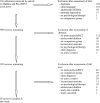Conflicts of interest and spin in reviews of psychological therapies: a systematic review
- PMID: 27118287
- PMCID: PMC4853969
- DOI: 10.1136/bmjopen-2015-010606
Conflicts of interest and spin in reviews of psychological therapies: a systematic review
Abstract
Objective: To explore conflicts of interest (COI) and their reporting in systematic reviews of psychological therapies, and to evaluate spin in the conclusions of the reviews.
Methods: MEDLINE and PsycINFO databases were searched for systematic reviews published between 2010 and 2013 that assessed effects of psychological therapies for anxiety, depressive or personality disorders, and included at least one randomised controlled trial. Required COI disclosure by journal, disclosed COI by review authors, and the inclusion of own primary studies by review authors were extracted. Researcher allegiance, that is, that researchers concluded favourably about the interventions they have studied, as well as spin, that is, differences between results and conclusions of the reviews, were rated by 2 independent raters.
Results: 936 references were retrieved, 95 reviews fulfilled eligibility criteria. 59 compared psychological therapies with other forms of psychological therapies, and 36 psychological therapies with pharmacological interventions. Financial, non-financial, and personal COI were disclosed in 22, 4 and 1 review, respectively. 2 of 86 own primary studies of review authors included in 34 reviews were disclosed by review authors. In 15 of the reviews, authors showed an allegiance effect to the evaluated psychological therapy that was never disclosed. Spin in review conclusions was found in 27 of 95 reviews. Reviews with a conclusion in favour of psychological therapies (vs pharmacological interventions) were at high risk for a spin in conclusions (OR=8.31 (1.41 to 49.05)). Spin was related in trend to the inclusion of own primary studies in the systematic review (OR=2.08 (CI 0.83 to 5.18) p=0.11) and researcher allegiance (OR=2.63 (0.84 to 8.16) p=0.16).
Conclusions: Non-financial COI, especially the inclusion of own primary studies into reviews and researcher allegiance, are frequently seen in systematic reviews of psychological therapies and need more transparency and better management.
Keywords: bias; conflict of interest; psychotherapy; systematic review.
Published by the BMJ Publishing Group Limited. For permission to use (where not already granted under a licence) please go to http://www.bmj.com/company/products-services/rights-and-licensing/
Figures
References
-
- Lo B, Field MJ, eds. Conflict of interest in medical research, education, and practice, Institute of Medicine, 2009. - PubMed
Publication types
MeSH terms
LinkOut - more resources
Full Text Sources
Other Literature Sources
Medical


